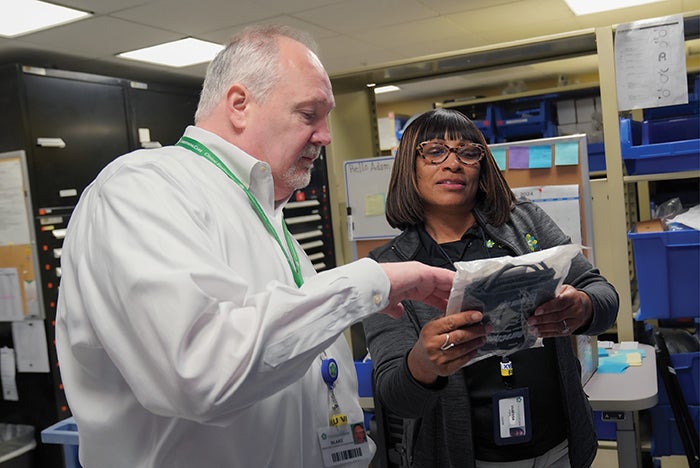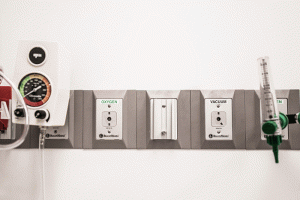Internal training program strengthens technician team

Vanessa Pope (right), a biomedical clerk at ChristianaCare, discusses equipment with Director of Clinical Engineering Blake Collins.
Image courtesy of ChristianaCare
ChristianaCare, headquartered in Newark, Del., reports that its 35 biomedical equipment technicians make up one of the largest clinical engineering teams in the nation. The team services more than 50,000 pieces of medical equipment used throughout locations in Delaware, Pennsylvania and Maryland. And, according to Blake Collins, director of clinical engineering for ChristianaCare, it’s a team made up of individuals who bring a diverse range of backgrounds but a shared can-do spirit.
More than a decade ago, ChristianaCare established a feeder program to address workforce gaps in its biomed department. The program has been refined over time and encourages applications from any mechanically inclined individual, no matter their training. Today’s team features backgrounds ranging from mechanical and biomedical engineering degrees to individuals with military backgrounds and high school diplomas. In the role of inspectors, these individuals gain on-the-job training while performing high-volume, low-acuity preventive maintenance. As inspectors gain skills and demonstrate drive, Collins can move them into a biomed tech role once an opportunity arises.
Like many employers today, Collins says, “I hire for attitude and train for skill.”
Many of the students come into ChristianaCare through a relationship with Delaware Technical Community College in Dover, Del. “We host the students when they come in, and we’ve hired a few out of that program as well over the years,” Collins says. Other new hires may wind up pursuing education at this or other community colleges to secure necessary skills as they advance. The clinical engineering department also encourages its team to secure certifications through online training programs, with professional development paid for by the health system.
However, Collins is quick to add, “Nothing beats good old-fashioned time on the floor and working with other people through on-the-job training.” This real-world training includes a focus on cross-training. With roughly half of the clinical engineering team holding more than a decade of experience in their role, cross-training helps prevent the loss of knowledge that can rise with retirement.
“People always say ‘knowledge is power.’ I believe the sharing of knowledge is power,” Collins says.




